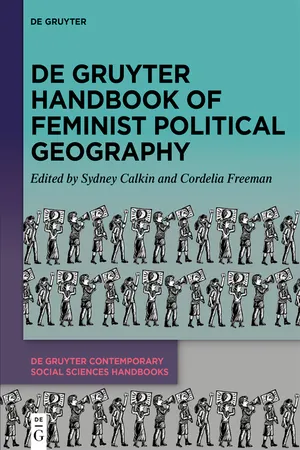
- 636 pages
- English
- PDF
- Available on iOS & Android
De Gruyter Handbook of Feminist Political Geography
About this book
Feminist Political Geography is a relatively new, but rapidly growing, area of interest in Geographical scholarship. It emerged from feminist engagement with the sub-discipline of Political Geography, which broadly concerns the intersection of politics, power, and space, and it responds to silences and absences in this sub-discipline as well as wider silences in Geography scholarship.
While early scholarship in Feminist Political Geography concentrated on including women's bodies and lives in scholarship, its focus has evolved and expanded over time. Today, Feminist Political Geography scholarship advances broader goals that do not necessarily entail a research focus on women, but push us to think about other lives and bodies that are traditionally absent from analysis. It challenges us to reimagine and build just futures. Like all feminist analysis, this body of scholarship is not content with describing or explaining injustices: it advances a normative critique of injustice and overtly commits itself to the project of justice.
In this book, the reader will find chapters authored by leading scholars who interrogate key ideas, debates, and developments, with a particular focus on intersectional ideas. Structured into four sections that go from the origins of Feminist Political Geography to its futures, this handbook is the definitive, state-of-the-art survey of this vibrant sub-discipline.
Frequently asked questions
- Essential is ideal for learners and professionals who enjoy exploring a wide range of subjects. Access the Essential Library with 800,000+ trusted titles and best-sellers across business, personal growth, and the humanities. Includes unlimited reading time and Standard Read Aloud voice.
- Complete: Perfect for advanced learners and researchers needing full, unrestricted access. Unlock 1.4M+ books across hundreds of subjects, including academic and specialized titles. The Complete Plan also includes advanced features like Premium Read Aloud and Research Assistant.
Please note we cannot support devices running on iOS 13 and Android 7 or earlier. Learn more about using the app.
Information
Table of contents
- De Gruyter Handbook of Feminist Political Geography
- 1 Introduction
- Part I: Foundations
- Part II: Critical Interventions
- Part III: Spaces
- Part IV: Methodologies
- List of Contributors
- Index